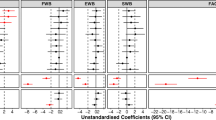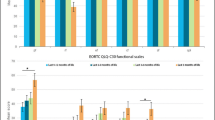Abstract
Purpose
Improving health-related quality of life (HRQL) is the main goal of palliative care and an important outcome for oncology trials. This study examines medical and sociodemographic determinants of HRQL in outpatients with advanced cancer.
Methods
Patients with metastatic gastrointestinal, genitourinary, breast, lung or gynecological cancer, ECOG 0-2, and clinical prognosis of 6 months to 2 years were recruited from outpatient medical oncology clinics. HRQL was measured using the FACT-G questionnaire and the FACIT-Sp meaning and peace (existential) subscale. The influence of demographic and medical characteristics on HRQL was determined using t tests and analysis of variance, with Tukey’s correction for multiple comparisons. Multivariate linear regression was used to determine independent predictors.
Results
Of 285 patients, 57% were female and the median age was 61 years; 44% were alive at latest follow-up; and of those deceased, the mean survival time was 10 months. The strongest determinants of overall HRQL were increased age (p < 0.001), good performance status (PS; p < 0.001) and survival time >6 months (p = 0.001). Compared to patients receiving cancer treatment, those awaiting new treatment had worse emotional well-being (p < 0.001), while those on surveillance or whose treatment had been stopped had worse existential well-being (p = 0.03). Male gender predicted better emotional and physical well-being and lower income predicted worse social well-being.
Conclusions
Age, PS, survival time, and treatment status are important determinants of HRQL in patients with advanced cancer. Decision aids, open communication, and involvement of supportive care specialists may improve emotional and existential distress associated with changing or stopping cancer treatment.
Similar content being viewed by others
References
World Health Organization. WHO definition of palliative care. Available from URL: http://www.who.int/cancer/palliative/definition/en. 2002. Accessed 23 Oct 2009
Kaasa S, Loge JH (2003) Quality of life in palliative care: principles and practice. Palliat Med 17:11–20
Morrison RS, Meier DE (2004) Clinical practice. Palliative care. N Engl J Med 350:2582–2590
Steinhauser KE, Christakis NA, Clipp EC, McNeilly M, McIntyre L, Tulsky JA (2000) Factors considered important at the end of life by patients, family, physicians, and other care providers. JAMA 284:2476–2482
Wilson KG, Chochinov HM, McPherson CJ, LeMay K, Allard P, Chary S et al (2007) Suffering with advanced cancer. J Clin Oncol 25:1691–1697
Whitford HS, Olver IN, Peterson MJ (2008) Spirituality as a core domain in the assessment of quality of life in oncology. Psycho Oncology 17:1121–1128
Holzner B, Kemmler G, Cella D, De Paoli C, Meraner V, Kopp M et al (2004) Normative data for functional assessment of cancer therapy—general scale and its use for the interpretation of quality of life scores in cancer survivors. Acta Oncol 43:153–160
Janda M, Disipio T, Hurst C, Cella D, Newman B (2009) The Queensland cancer risk study: general population norms for the Functional Assessment of Cancer Therapy-General (FACT-G). Psycho Oncology 18:606–614
Hjermstad MJ, Fayers PM, Bjordal K, Kaasa S (1998) Health-related quality of life in the general Norwegian population assessed by the European Organization for Research and Treatment of Cancer Core Quality of Life Questionnaire: the QLQ = C30 (+ 3). J Clin Oncol 16:1188–1196
Schwarz R, Hinz A (2001) Reference data for the quality of life questionnaire EORTC QLQ-C30 in the general German population. Eur J Cancer 37:1345–1351
Fossa SD, Hess SL, Dahl AA, Hjermstad MJ, Veenstra M (2007) Stability of health-related quality of life in the Norwegian general population and impact of chronic morbidity in individuals with and without a cancer diagnosis. Acta Oncol 46:452–461
Brucker PS, Yost K, Cashy J, Webster K, Cella D (2005) General population and cancer patient norms for the Functional Assessment of Cancer Therapy-General (FACT-G). Eval Health Prof 28:192–211
Jordhoy MS, Fayers P, Loge JH, Saltnes T, Ahlner-Elmqvist M, Kaasa S (2001) Quality of life in advanced cancer patients: the impact of sociodemographic and medical characteristics. Br J Cancer 85:1478–1485
Lundh HC, Seiger A, Furst CJ (2006) Quality of life in terminal care—with special reference to age, gender and marital status. Support Care Cancer 14:320–328
Fisch MJ, Titzer ML, Kristeller JL, Shen J, Loehrer PJ, Jung SH et al (2003) Assessment of quality of life in outpatients with advanced cancer: the accuracy of clinician estimations and the relevance of spiritual well-being—a Hoosier oncology group study. J Clin Oncol 21:2754–2759
Brady MJ, Peterman AH, Fitchett G, Mo M, Cella D (1999) A case for including spirituality in quality of life measurement in oncology. Psycho Oncology 8:417–428
Katzman R, Brown T, Fuld P, Peck A, Schechter R, Schimmel H (1983) Validation of a short Orientation-Memory-Concentration Test of cognitive impairment. Am J Psychiatry 140:734–739
Jordhoy MS, Fayers P, Loge JH, Ahlner-Elmqvist M, Kaasa S (2001) Quality of life in palliative cancer care: results from a cluster randomized trial. J Clin Oncol 19:3884–3894
Donner A, Piaggio G, Villar J, Pinol A, Al Mazrou Y, Ba'aqeel H et al (1998) Methodological considerations in the design of the WHO antenatal care randomized controlled trial. Paediatr Perinat Epidemiol 12(Suppl 2):59–74
Kronborg O, Fenger C, Olsen J, Jorgensen OD, Sondergaard O (1996) Randomized study of screening for colorectal cancer with faecal-occult blood test. Lancet 348:1467–1471
Cella DF, Tulsky DS, Gray G, Sarafian B, Linn E, Bonomi A et al (1993) The functional assessment of cancer therapy scale: development and validation of the general measure. J Clin Oncol 11:570–579
Webster K, Cella D, Yost K (2003) The Functional Assessment of Chronic Illness Therapy (FACIT) measurement system: properties, applications, and interpretation. Health Qual Life Outcomes 1(1):79
Cella D, Eton DT, Lai JS, Peterman AH, Merkel DE (2002) Combining anchor and distribution-based methods to derive minimal clinically important differences on the Functional Assessment of Cancer Therapy (FACT) anemia and fatigue scales. J Pain Symptom Manage 24:547–561
Yost KJ, Eton DT (2005) Combining distribution- and anchor-based approaches to determine minimally important differences: the FACIT experience. Eval Health Prof 28:172–191
Peterman AH, Fitchett G, Brady MJ, Hernandez L, Cella D (2002) Measuring spiritual well-being in people with cancer: the functional assessment of chronic illness therapy—Spiritual Well-being Scale (FACIT-Sp). Ann Behav Med 24:49–58
Edmondson D, Park CL, Blank TO, Fenster JR, Mills MA (2008) Deconstructing spiritual well-being: existential well-being and HRQOL in cancer survivors. Psycho Oncology 17:161–169
Charlson ME, Pompei P, Ales KL, MacKenzie CR (1987) A new method of classifying prognostic comorbidity in longitudinal studies: development and validation. J Chronic Dis 40:373–383
Extermann M (2000) Measuring comorbidity in older cancer patients. Eur J Cancer 36:453–471
Statistics Canada. Ethnic Origin. http://www12.statcan.ca/english/census01/Products/Reference/dict/pop040.htm. 2002. Accessed 23 Dec 2009
Feinstein AR (1996) Multivariable analysis: an introduction. Yale University Press, New Haven
Hjermstad MJ, Fayers PM, Bjordal K, Kaasa S (1998) Using reference data on quality of life—the importance of adjusting for age and gender, exemplified by the EORTC QLQ-C30 (+3). Eur J Cancer 34:1381–1389
Exley C, Letherby G (2009) Managing a disrupted lifecourse: issues of identity and emotion work. Health 5:112–132
Rauch PK, Muriel AC (2004) The importance of parenting concerns among patients with cancer. Crit Rev Oncol Hematol 49(1):37–42
Mor V, Allen S, Malin M (1994) The psychosocial impact of cancer on older versus younger patients and their families. Cancer 74:2118–2127
Chow E, Abdolell M, Panzarella T, Harris K, Bezjak A, Warde P et al (2008) Predictive model for survival in patients with advanced cancer. J Clin Oncol 26:5863–5869
Nelson CJ, Rosenfeld B, Breitbart W, Galietta M (2002) Spirituality, religion, and depression in the terminally ill. Psychosomatics 43:213–220
Breitbart W (2002) Spirituality and meaning in supportive care: spirituality- and meaning-centered group psychotherapy interventions in advanced cancer. Support Care Cancer 10:272–280
Ando M, Morita T, Okamoto T, Ninosaka Y (2008) One-week short-term life review interview can improve spiritual well-being of terminally ill cancer patients. Psycho Oncology 17:885–890
Harrington SE, Smith TJ (2008) The role of chemotherapy at the end of life: "when is enough, enough?". JAMA 299:2667–2678
Hopwood P, Stephens RJ (2000) Depression in patients with lung cancer: prevalence and risk factors derived from quality-of-life data. J Clin Oncol 18:893–903
De Leeuw JR, de Graeff A, Ros WJ, Blijham GH, Hordijk GJ, Winnubst JA (2001) Prediction of depression 6 months to 3 years after treatment of head and neck cancer. Head Neck 23:892–898
Carlson LE, Angen M, Cullum J, Goodey E, Koopmans J, Lamont L et al (2004) High levels of untreated distress and fatigue in cancer patients. Br J Cancer 90:2297–2304
Strong V, Waters R, Hibberd C, Rush R, Cargill A, Storey D et al (2007) Emotional distress in cancer patients: the Edinburgh Cancer Center symptom study. Br J Cancer 96:868–874
Pascoe S, Edelman S, Kidman A (2000) Prevalence of psychological distress and use of support services by cancer patients at Sydney hospitals. Aust NZ J Psychiatry 34:785–791
Aass N, Fossa SD, Dahl AA, Moe TJ (1997) Prevalence of anxiety and depression in cancer patients seen at the Norwegian Radium Hospital. Eur J Cancer 33:1597–1604
Husain AF, Stewart K, Arseneault R, Moineddin R, Cellarius V, Librach SL et al (2007) Women experience higher levels of fatigue than men at the end of life: a longitudinal home palliative care study. J Pain Symptom Manage 33:389–397
Akechi T, Kugaya A, Okamura H, Yamawaki S, Uchitomi Y (1999) Fatigue and its associated factors in ambulatory cancer patients: a preliminary study. J Pain Symptom Manage 17:42–48
Redeker NS, Lev EL, Ruggiero J (2000) Insomnia, fatigue, anxiety, depression, and quality of life of cancer patients undergoing chemotherapy. Sch Inq Nurs Pract 14:275–290
Pater JL, Zee B, Palmer M, Johnston D, Osoba D (1997) Fatigue in patients with cancer: results with national cancer institute of canada clinical trials group studies employing the EORTC QLQ-C30. Support Care Cancer 5:410–413
Walsh D, Donnelly S, Rybicki L (2000) The symptoms of advanced cancer: relationship to age, gender, and performance status in 1,000 patients. Support Care Cancer 8:175–179
van Wijk CM, Kolk AM (1997) Sex differences in physical symptoms: the contribution of symptom perception theory. Soc Sci Med 45:231–246
Barsky AJ, Peekna HM, Borus JF (2001) Somatic symptom reporting in women and men. J Gen Intern Med 16:266–275
Cella D, Hahn EA, Dineen K (2002) Meaningful change in cancer-specific quality of life scores: differences between improvement and worsening. Qual Life Res 11:207–221
Wan GJ, Counte MA, Cella DF, Hernandez L, Deasy S, Shiomoto G (1999) An analysis of the impact of demographic, clinical, and social factors on health-related quality of life. Value Health 2:308–318
Jordhoy MS, Inger RG, Helbostad JL, Oldervoll L, Loge JH, Kaasa S (2007) Assessing physical functioning: a systematic review of quality of life measures developed for use in palliative care. Palliat Med 21:673–682
Acknowledgement
This research is funded by the Canadian Cancer Society (CCS Grant #017257 and #020509; CZ). The funding source had no role in the design, conduct, or preparation of the data, or in the preparation of the manuscript. This research was funded in part by the Ontario Ministry of Health and Long Term Care. The views expressed do not necessarily reflect those of the OMOHLTC. We are grateful to the patients who participated in this study, and to the clinical staff of the medical oncology clinics. Many thanks to Christopher Lo for his advice concerning statistical analyses.
Conflict of interest statement
None declared.
Author information
Authors and Affiliations
Corresponding author
Additional information
This research is funded by the Canadian Cancer Society (CCS Grant #017257 and #020509; CZ). Results of this study were previously published/presented in part at the Multinational Association of Supportive Care in Cancer, 21st International Symposium, June 26-28, 2008, Houston, Texas.
Rights and permissions
About this article
Cite this article
Zimmermann, C., Burman, D., Swami, N. et al. Determinants of quality of life in patients with advanced cancer. Support Care Cancer 19, 621–629 (2011). https://doi.org/10.1007/s00520-010-0866-1
Received:
Accepted:
Published:
Issue Date:
DOI: https://doi.org/10.1007/s00520-010-0866-1




